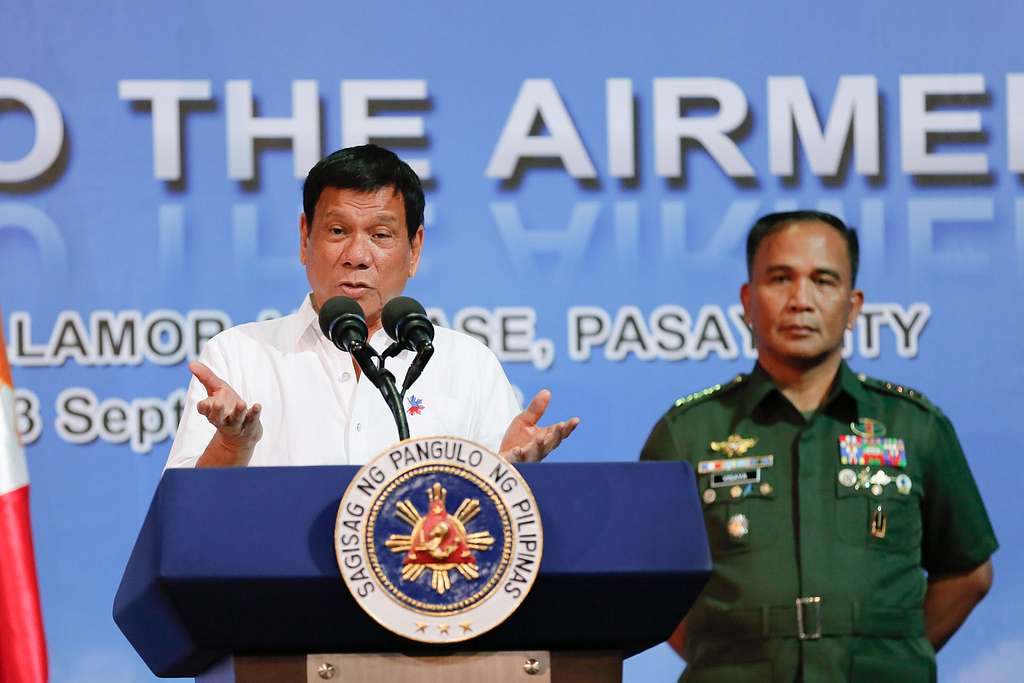Former Philippine President Rodrigo Duterte has warned that if the intensifying rivalry between the United States and China reaches a critical point, it could potentially turn the Philippines into a “graveyard.”
Ukraine ‘Fails’ To Gauge Russian Military Might; New Report Says ‘Unrealistic To Expect Moscow To Ever Run Out Of Missiles’
The warning comes as the defense partnership between the Philippines and the US has grown stronger in recent months. The Southeast Asian country has long faced the delicate task of navigating the competing interests of Beijing and Washington.
Duterte said he held frequent meetings with the Chinese ambassador, Huang Xilian, to emphasize that the Philippines did not harbor any conflicts with Beijing.
In response, Huang conveyed a cautionary message to the China-friendly former leader, suggesting that if the current administration under Ferdinand Marcos “provides places … where there can be an aggression against Beijing, the Philippines would always be a target.”
“I reminded him again that the Philippines does not have a quarrel with China,” Duterte added.
The Chinese ambassador’s statement was directed towards the 2014 Enhanced Defense Cooperation Agreement (EDCA), in which Manila granted the US access to four more bases near the Taiwan Strait and the disputed South China Sea in April.
This development increased the total number of military facilities available for US use in the Philippines to nine, a move that drew attention and warning from China. The agreement to provide additional bases, according to China, is “stoking the fire” of regional unrest.
On the other hand, President Marcos Jr. has consistently argued that the Enhanced Defense Cooperation Agreement (EDCA) was originally conceived to address the impacts of climate change and not meant for any “offensive action” against other countries.
He also questioned the decision of his successor, President Marcos Jr., to provide the country’s former colonial ruler (the US) access to additional bases, expressing his reservations about this move.
During his six years in office, Duterte is known for steering the Philippines away from the US and fostering stronger ties with China.
Thus, his warning is not unexpected given that during his Presidency, he often launched obscenity-filled tirades against the United States and downplayed long-standing territorial issues with Beijing.
US To Deploy Its Nuclear Assets In Philippines
Under the current leadership of President Marcos Jr, Manila has taken significant steps to bolster its defense cooperation with Washington. Notably, in April, the country hosted its largest joint military exercises with the United States, signaling a further deepening of their military alliance.
In 2022, the United States provided a substantial grant of $100 million to enhance defense capabilities and promote military modernization in the Southeast Asian nation.
Furthermore, there are plans to allocate an additional $100 million to improve military bases to which the US has access under the Enhanced Defense Cooperation Agreement (EDCA).
However, the former President claimed that Washington could choose to deploy its nuclear assets in the military installations it has access to within the Philippines.
“By granting bases to America, we can be sure – and I am sure as the sun rises in the east – that these nuclear bases, which now increased to 17, will have nuclear warheads,” Duterte added.

Duterte’s claim that there are 17 EDCA sites in the country remains unclear, as the government has officially announced only nine such locations.
Duterte alleged that it would be naive to think the US would not deploy nuclear weapons on the Philippines. He highlighted the significant difference that nuclear bombs would make in the geopolitical landscape.
Duterte further stated his conviction that if a war were to erupt, the Philippines would face dire consequences and become a “graveyard.”
Tensions between the Philippines and China have intensified due to ongoing disputes in the South China Sea, where Manila and other nations have conflicting territorial claims with Beijing.
The Philippine Navy has recently deployed its anti-submarine warfare assets in the West Philippine Sea for the first time to enhance its capability to detect and engage enemy vessels.
Philippines Looks To Procure HIMARS & More Brahmos
During the Army Artillery Regiment’s 125th Anniversary Ceremony, the Philippine Army Chief Romeo Brawner announced that the country is planning to acquire advanced weapon systems, including the American HIMARS MLRS (High Mobility Artillery Rocket System) and the additional Indian-made BrahMos supersonic anti-ship cruise missiles.
“We [will] have anti-ship missiles, we will have air-defense artillery, we will have HIMARS coming in the next years,” Brawner said.
The Philippine Army is seeking to procure the BrahMos supersonic anti-ship cruise missile as part of its Shore-Based Missile System requirement, following the Philippine Navy’s previous procurement of three batteries for the Philippine Marine Corps.
The first battery is expected to arrive in December for the Philippine Marine Corps’ Coastal Defense Regiment, and the military is likely to procure two batteries this year, Times of India reported.
The Armed Forces of the Philippines will be able to deploy five BrahMos batteries for coastal defense purposes.
Additionally, the Army Artillery Regiment plans to acquire the M142 High Mobility Rocket Artillery System, providing long-range fires for the service, alongside the American MLRS (Multiple Launch Rocket System) mentioned by Brawner.
Following Russia’s invasion of Ukraine, the importance of having multiple-launch rocket artillery systems has become evident in modern warfare.
The Philippine Army aims to enhance its firepower capabilities and strengthen its overall combat effectiveness to respond effectively to various operational scenarios by acquiring HIMARS.
- Contact the author at ashishmichel(at)gmail.com
- Follow EurAsian Times on Google News